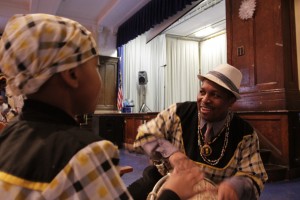By Camilo Hannibal Smith
The auditorium at Bronx Elementary School 75 in Foxhurst throbbed to the sounds of Garifuna segunda and primera drums last Sunday night. The conga drum-like instruments, one plays the lead melody and the other a rival rhythm, provide the backbeat for most Garifuna events. And Sunday’s— a prelude to a unique annual cultural pageant,—was not any different. For a few hours, the elementary school’s auditorium became electrified by a vibrant showcase of Garifuna pride.

Contestants in the Miss Garifuna Cultural Pageant 2011 file into the auditorium of P.S. 75 located in Bronx. Photo: Camilo H. Smith
The Garifuna are indigenous to the Caribbean islands of St. Vincent and the Grenadines. Over 200 years ago, the ethnic group was exiled to the islands off the coast of Central America. Today, nearly 100,000 of them are estimated to live in the Bronx.
On Sunday, as hopefuls lined up to initiate the competition for the community’s fifth Miss Garifuna Cultural Pageant, which will be held on April 10, snippets of the ancestoral Garifuna language, based on the Arawak language spoken by the Carib Indians, floated through the air, though the dominant language heard was Spanish.
“Even though we come from Latin America, we have our language, we have our culture, ” says Mirta Colon, a Honduran of Garifuna decent who emigrated to New York 40 years ago.
Colon, a social worker with the South Bronx Mental Clinic, is also the founder of Casa Yurumein, a non-profit organization based on Fulton Avenue dedicated to preserving the community’s culture and language, which many feel is in danger of disappearing. Casa Yurumein serves as the community’s cultural hub, drawing different groups of Garifuna from all over the area. It also houses Colon’s health-focused initiative Hondurans Against AIDS.
“We have in Honduras 53 Garifuna towns. In Belize we have 11; in Guatemala, we have two and in Nicaragua we have four,” Colon says.
Colon says the idea of starting a Garifuna cultural pageant was borrowed from a similar event put on by the Belizean community. She thought it was a good way to teach children about their culture. On Sunday, she sat in the audience of over 50 people. Women in pastel-colored yellow and pink dresses and head scarves followed a group of a half-dozen drummers dressed in yellow down the center aisle of the auditorium. Behind them, a coterie of 11 nervous teen girls — all pageant hopefuls who range in age from 13 to 20 — followed the procession to the stage, singing and smiling for their proud parent’s cameras.
“If you know who you are, you know where you’re coming from and I think that’s very important for every individual,” says Colon, who also teaches Garifuna culture classes.
She’s the one who makes sure that everything is in place for the pageant, acting as director and producer of the show which features everything from poetry, to singing to dancing.
The girls, in flowing floral print dresses nervously filed on stage to present themselves to the local community. One at a time, they each took a turn at the microphone and called out their family’s home village to cheers and whistles.
“Good afternoon ladies and gentlemen, my name is Perla Colon,” said one contestant, not related to the event’s director. “My mother’s name is Sylvia Colon. I am 16 years old and I am here to represent the small but loving Garinagu village of Nuevo Armenia [Honduras]. Thank you.”
Most of the young ladies spoke in English, but a few used their native Garifuna language — and the audience clearly loved it. The community has marked March 11 to April 12 as Garifuna Heritage Month and a bill to make the month an official celebration was approved by the state Senate in December.
The community has been in New York since the 1930s, but came into the spotlight after the March 25, 1990 Happyland fire, which claimed 87 lives at a Garifuna nightclub party on Southern Boulevard.

Alex Colon teaches his nephew Tramell Cesimiro Cayetano how to keep the beat on Garifuna drums. Photo: Camilo H. Smith
During the taking of the 2010 Census, the Garifuna Coalition USA, a Bronx-based civic organization, pushed to have their numbers counted. The government has yet to release official numbers, but Jose Avila, the group’s president estimates that as many as half of New York’s 200,000 Garifuna live in the Bronx, “which makes it,” he says, “the largest Garifuna community in the world.”
The United Nations Educational, Scientific and Cultural Organization (UNESCO) has put the Garifuna language and culture on its list of safeguarded world cultures, which means it’s in danger of disappearing.
“It’s basically on the decline,” says Alex Colon, 40, who emigrated from Belize two decades ago, and also shares one of the most common Spanish last names with many in his community. It’s a community with a shared passion for preserving its heritage from its base in the Bronx and amid the joyful pounding of the segunda drums last Sunday evening, any decline of Garifuna culture was hardly evident.

